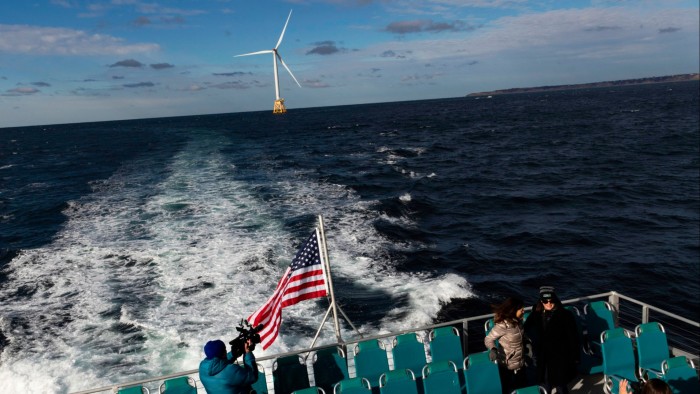Unlock the Editor’s Digest for free
Roula Khalaf, Editor of the FT, selects her favourite stories in this weekly newsletter.
The world’s largest offshore wind developer has announced fresh writedowns on its US business, sending its shares down sharply as the inauguration of Donald Trump as president clouds the outlook for the renewables sector.
Ørsted announced impairments totalling DKr12.1bn ($1.7bn) on Monday evening, blaming interest rates, supply chain challenges and “market uncertainties” affecting the value of its seabed leases.
Ørsted’s Copenhagen-listed shares fell more than 17 per cent as the market opened on Tuesday morning, adding to their decline over the past year.
Monday evening’s announcement was a blow to the Danish group’s efforts to move on from DKr28.4bn of impairments to its US portfolio in 2023. It had also blamed that writedown on rising interest rates and supply chain challenges.
The fresh writedowns were revealed hours after Trump’s inauguration and his immediate suspension of new offshore wind leasing.
“We’re not going to do the wind thing. Big, ugly wind mills. They ruin your neighbourhood,” he said, according to a Reuters report.
Ørsted’s two offshore US projects in construction, Revolution Wind and Sunrise Wind, already have the required federal permits.
But Trump’s approach is weighing heavily on the sector. Shares in Vestas, a Danish-listed wind turbine maker, fell more than 4 per cent on Tuesday morning.
In a call with analysts on Tuesday morning, Mads Nipper, Ørsted’s chief executive, said the company was reviewing Trump’s suspension order, but declined to comment further.
On Monday Trump signed an executive order initiating the US’s withdrawal from the Paris climate accord, signed in 2016 as part of a global effort to curb climate change.
Announcing the impairments on Monday, Nipper said they were “very disappointing”, but the company remained “committed to the US market for the long term”.
He added: “We continue to navigate the complexities and uncertainties we face in a nascent offshore industry in the new US market.”

Ørsted entered the US in 2018 as a pioneer in its offshore wind industry, but struggled, along with many of its peers, when interest rates rose and supply chains came under strain following the Covid-19 pandemic.
In November 2023, it said it was abandoning two projects off the coast of New Jersey, spooking shareholders with the DKr28.4bn writedown, which was higher than expected.
In an attempt to turn the business around, the company said last February that it was suspending its dividend, cutting up to 800 jobs, and withdrawing from offshore wind markets in Norway, Spain and Portugal in an attempt to focus on core areas.
In Monday’s announcement, Ørsted said increases in US long-dated interest rates had pushed up its cost of capital, accounting for DKr4.3bn of the DKr12.1bn total impairments.
It booked another DKr3.5bn because of the “market uncertainties” affecting the value of several seabed leases, while the final DKr4.3bn covered delays to its Sunrise Wind offshore wind project off the coast of New York. This project is now due to be up and running in the second half of 2027.
However, Ørsted said it would stick to its full-year operating profit guidance of DKr24.8bn for 2024. Its wind farms, both on land and at sea, had performed in line with expectations, it said. Revenues in 2023 totalled DKr79.3bn.
Before Tuesday’s fall, Ørsted’s shares had dropped almost 20 per cent over the past 12 months, and are roughly 77 per cent below their peak in January 2021 at the height of interest in environmental stocks.


